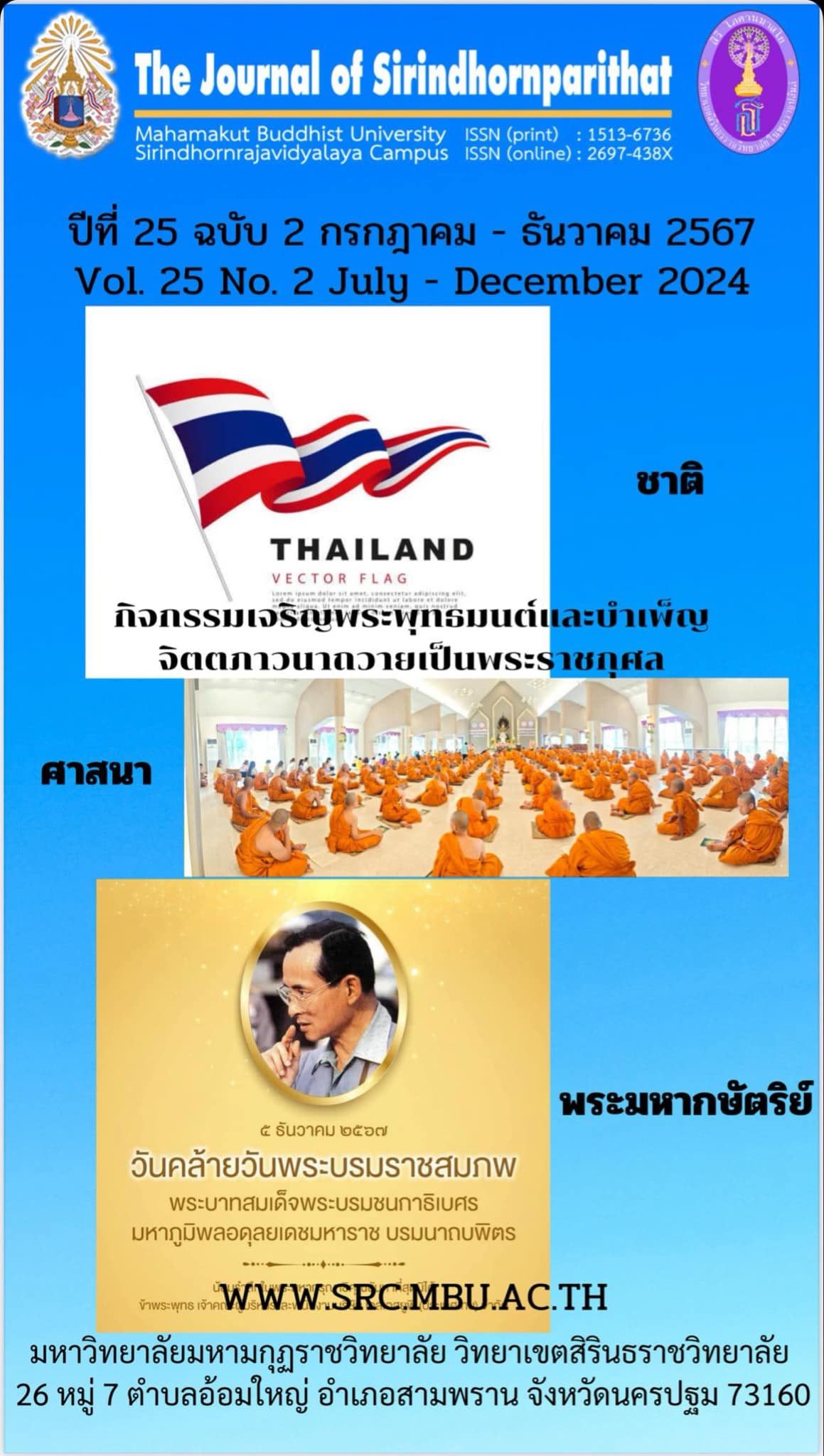Leadership of School Administrators Affecting Student AffairsAdministration in Schools Under the Secondary Educational Service Area Office, Nonthaburi
Keywords:
Leadership of educational institution administrators, student affairs administrationAbstract
The objectives of the research are 1) to study the leadership of educational institution administrators in schools under the Nonthaburi Secondary Educational Service Area Office 2) to study student affairs administration in schools under the Nonthaburi Educational Service Area Office. Nonthaburi Secondary Education 3) To study the leadership of educational institution administrators that affects student affairs administration in schools under the Nonthaburi Secondary Educational Service Area Office.
The results of the research found that the overall leadership of educational institution administrators at a high level When considering each aspect, it was found that It is at a high level in all 4 areas, ordered from high to low average, namely 1) having influence with ideology, 2) creating a vision. 3) Inspiring others 4) Inducing others Overall student affairs administration at a high level When considering each aspect, it was found that It is at a high level in all 4 areas, arranged from high to low average, including 1) maintaining discipline and behavior, 2) organizing student activities, 3) student welfare work, 4) student support system work. In the Stepwise Multiple Regression analysis, the variables that were selected into the equation were X4, X2, X3, and and .116, respectively, and the regression coefficients in the form of standard scores are .348, .188, .162, and .117, respectively. The four variables together predict the variance of student affairs administration in schools under the area office. Secondary education in Nonthaburi was 37.10%. The forecast equation can be written as follows: The forecast equation for student affairs administration in schools in Under the jurisdiction of the Nonthaburi Secondary Educational Service Area Office Using raw scores Y´ = .369+ .330 + .202 + .163 + .116 equations for predicting student affairs administration in schools Under the jurisdiction of the Nonthaburi Secondary Educational Service Area Office Using the standard score Z´y = .348 + .188 + .162 + .117
References
กระทรวงศึกษาธิการ. (2553). พระราชบัญญัติการศึกษาแห่งชาติ พ.ศ. 2542 แก้ไขเพิ่มเติม (ฉบับที่ 2) พ.ศ. 2545 และ (ฉบับที่ 3) พ.ศ. 2553 พร้อมกฎกระทรวงที่เกี่ยวข้องและพระราชบัญญัติการศึกษาภาคบังคับ. กรุงเทพฯ: ครุสภาลาดพร้าว.
กัลยาณี รัตนบุตร. (2564). รูปแบบบริหารระบบคุณภาพงานกิจการนักเรียนในสถานศึกษาสังกัดสำนักงานเขตพื้นที่การศึกษาประถมศึกษา 9. (วิทยานิพนธ์ศึกษามหาบัณฑิต) พิษณุโลก: มหาวิทยาลัยนเรศวร.
จินตนา ดีดวงพันธ์. (2565). ภาวะผู้นำเชิงสร้างสรรค์ของผู้บริหารสถานศึกษาที่ส่งผลต่อการเป็นองค์กรแห่งการเรียนรู้ของสถานศึกษา สังกัดสำนักงานเขตพื้นที่การศึกษามัธยมศึกษามุกดาหาร. (วิทยานิพนธ์ศึกษามหาบัณฑิต). สกลนคร: มหาวิทยาลัยราชภัฏสกลนคร.
นิศาชล บำรุงภักดี. (2563). ความสัมพันธ์ระหว่างภาวะผู้นำทางเทคโนโลยีสารสนเทศของผู้บริหารสถานศึกษากับประสิทธิผลโรงเรียน สังกัดองค์กรปกครองส่วนท้องถิ่นจังหวัดสกลนคร เขต 1. (วิทยานิพนธ์ศึกษามหาบัณฑิต) สกลนคร: มหาวิทยาลัยราชภัฏสกลนคร.
ปิยพร บุญใบ. (2563). ภาวะผู้นำทางวิชาการของผู้บริหารที่ส่งผลต่อประสิทธิผลการประกันคุณภาพภายในของสถานศึกษา สังกัดสำนักงานเขตพื้นที่การศึกษาประถมศึกษาสกลนคร เขต 1. (วิทยานิพนธ์ศึกษามหาบัณฑิต) สกลนคร: มหาวิทยาลัยราชภัฏสกลนคร.
สุรสุนทร โคตรบรรเทา. (2560). ภาวะผู้นำในองค์กรสถานศึกษา. กรุงเทพฯ: ปัญญาชน.
สุธิกานต์ บริเอก. (2564). ภาวะผู้นำของผู้บริหารสถานศึกษาที่ส่งผลการปฏิบัติงานของครูผู้สอนในโรงเรียน สังกัดสำนักงานเขตพื้นที่การศึกษามัธยมศึกษา เขต 22. สกลนคร: มหาวิทยาลัยราชภัฏสกลนคร.
อดิศักดิ์ ก่ำเชียงคำ. (2561). การพัฒนาประสิทธิภาพการบริหารจัดการงานกิจการนักเรียนโรงเรียนสนธิราษฎร์วิทยา. (วิทยานิพนธ์ศึกษามหาบัณฑิต) สกลนคร: มหาวิทยาลัยราชภัฏสกลนคร.
อรอุมา ศรีประทุมวงศ์. (2563). การศึกษาภาวะผู้นำการเปลี่ยนแปลงของผู้บริหารสถานศึกษาศูนย์การศึกษานอกระบบและการศึกษาตามอัธยาศัยกลุ่มจังหวัดภาคตะวันออกเฉียงเหนือตอนบน. (วิทยานิพนธ์ศึกษามหาบัณฑิต) สกลนคร: มหาวิทยาลัยราชภัฏสกลนคร.
Campbell F Ronald, & others. (1977). Introduction to Educational dministration. Boston: Allyn & Bocon.
Cherry,k. (2013). What is democratic leadership ?. Retrieved. December 22, 2022, from https://www.verywellmind.com/what-is-democratic-leadership.
Coleman, D. & Adam, R. c. (2008). Establising construct validity and reliability for the NAESP professional development inventory. Journal of Personal, 10(3), 194-200.
Cook, C. W., Hunsaker,P. L. & Coffey, R. E., (1997). Management and organizational behavior. Burr Ridge, IL: Irwin.
Crawford, LM.(2014). leadership and teams in Educational Mangement. Buckingham: The open Universtiy.
Ejimofor, F , O, (2008). Principals’ Transformational Leadership Skills and Their Teacher’ s Jod Satisfaction in Nigeria. Dissertation Ph.D. Thesis in Philosophy, Nigeria. Cleveland State University.
Engelbride, E. P. & T. Goodale. (2007). Survey on student affairs: Findings and implications. Philadelphin, PA.: Presented at the meeting of the National Association of Student Personnel Administrators.
Faber F. Charles, & Shearon F. Gilbert. (1987). Elementary School Administration. New York: Holt Rhinehart & Winston,
Green & Other. (2008). An Exploratoon of High-Quality Studeny Affairs Learning Outcomes Assessment Practices. NASPA Journal, 2015. (32). 20-30.
Goodman, R. & other. (2003). Using the strengths and difficulties questionnarire (SDQ) to screen for child psychiatric discipline in a community samples. Dissertation Abstracts International, 65(10), 111178-A.
Downloads
Published
Issue
Section
License
Copyright (c) 2024 Mahamakut Buddhist University

This work is licensed under a Creative Commons Attribution-NonCommercial-NoDerivatives 4.0 International License.
บทความที่ได้รับการตีพิมพ์เป็นลิขสิทธิ์ของ มหาวิทยาลัยมหามกุฏราชวิทยาลัย วิทยาเขตสิรินธรราชวิทยาลัย
ข้อความที่ปรากฏในบทความแต่ละเรื่องในวารสารวิชาการเล่มนี้เป็นความคิดเห็นส่วนตัวของผู้เขียนแต่ละท่านไม่เกี่ยวข้องกับหาวิทยาลัยมหามกุฏราชวิทยาลัย วิทยาเขตสิรินธรราชวิทยาลัย และคณาจารย์ท่านอื่นๆในมหาวิทยาลัยฯ แต่อย่างใด ความรับผิดชอบองค์ประกอบทั้งหมดของบทความแต่ละเรื่องเป็นของผู้เขียนแต่ละท่าน หากมีความผิดพลาดใดๆ ผู้เขียนแต่ละท่านจะรับผิดชอบบทความของตนเองแต่ผู้เดียว



